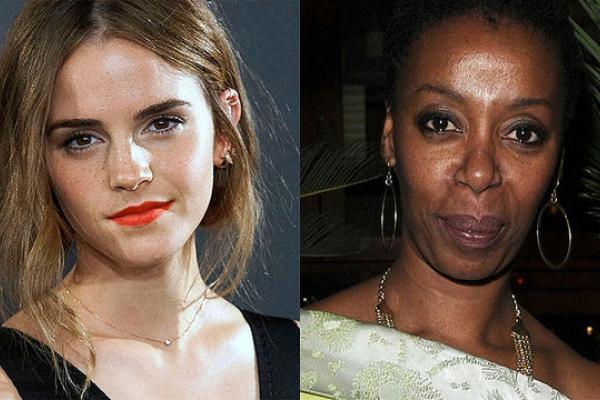I was in tears at the news.
Hermione is brown now, y'all. And we’re not going back.
Yes, that’s right! Swaziland-born actress Noma Dumezweni will portray Hermione Granger in the broadway play Harry Potter and the Cursed Child, and I am blown away.
It doesn’t matter if you don’t know a lick about Harry Potter (but seriously, read a book and catch up). The fact that a beautiful black woman will be playing one of the most beloved characters of our generation is no small feat.
As a child, I adored Hermione. I loved that she had unruly hair like me and hated her teeth like me and was under-appreciated for her intelligence and bookish knowledge, which is how I felt throughout my entire childhood and into adulthood. Hermione and the Power Puff Girls and Velma were my jam: smart, creative, powerful girls.
It wasn’t until I was an adult that I realized that all of my idols in writing where white, just like my TV and movie idols: Engles, Rowling, Snicket, Lewis. Where does that leave a brown girl with words begging to fly from her fingertips? Where does that leave so many people of color who read and write and act and create? Where is our representation?
When you grow up without characters that look like you or have ethnic names like yours, you grow up with a confused and, more importantly, limited sense of voice.
Hollywood doesn’t get that. It feels very comfortable putting white actors and actresses into ethnic stories, such as Emma Stone playing a woman of Chinese and Native Hawaiian descent (nope-nope-nope) and casting Jake Gyllenhaal in Prince of Persia. (And don’t even get me started on Katniss Everdeen.)
But have an Indian man play the lead in The Martian? An Ethiopian woman taking Liam Hemsworths’ place in Independence Day? Choose Egyptian men and women for leads in Exodus: Gods and Kings? Nah, we’re good.
With the calamity that is #OscarsSoWhite, I read a lot of people asking, so how do you fix it?
I think we start by actually taking race and ethnicity seriously. You can’t fix representation if you don’t care or respect ethnic diversity. Hollywood must stop sacrificing the racial and cultural accuracy of its characters, whether they are historical or fictional, in order to cast white stars. If a character is described as being Korean, South African, or Peruvian, then cast actresses from those cultures! If biographies, novels, and scripts are vague in racial description, then for the love of all that is good, stop assuming they are white.
People of color have spent their whole lives taking on the stories of people who do not look like them, seeing movies and reading books with characters they have little in common with, and have been taught that their own stories just are not as interesting, or that no one wants to see a strong black actor play anything other than a thug, an absent father, or Inmate #3.
Isn’t it time we stopped assuming every security guard, every pilot, and every lawyer on a screen should be a man? What if Hispanic women got parts other than being someone’s nanny or housekeeper? What if black women won Oscars for playing substantial characters, rather than for playing slaves, maids, or poor urban mothers?
Netflix recently cast actors for its rendition of A Series of Unfortunate Events. Despite proclaiming open-race casting calls, all of its leads characters are white. How incredible would it have been for the same company that produced diverse masterpieces like Master of None and Orange Is The New Black to take this glorious adventure of a story and turn it on its head?
But it didn’t.
So when you see a media conglomerate making excuses for itself, point to this — and Aloha andThe Last Airbender and The Social Network — and remind them that they have had their chances, and they chose the easier path of white washing. And demand with your movie ticket choices that they actually try next time.
This post originally appeared at 20somethingsurvival.
Got something to say about what you're reading? We value your feedback!
